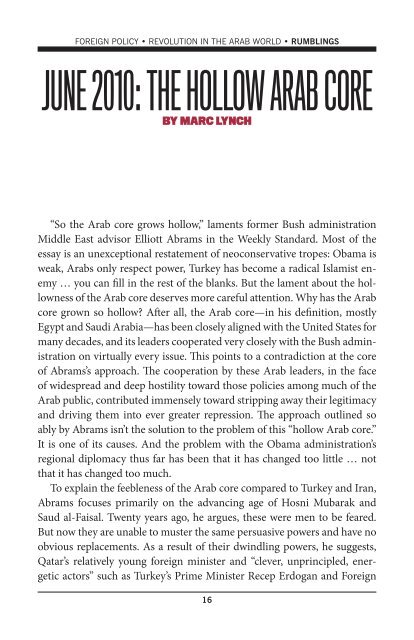Revolution in the Arab World - Observation of a lost soul Blog
Revolution in the Arab World - Observation of a lost soul Blog
Revolution in the Arab World - Observation of a lost soul Blog
Create successful ePaper yourself
Turn your PDF publications into a flip-book with our unique Google optimized e-Paper software.
foreign policy • revolution <strong>in</strong> <strong>the</strong> arab world • rumbl<strong>in</strong>gs<br />
June 2010: The Hollow <strong>Arab</strong> Core<br />
By Marc Lynch<br />
“So <strong>the</strong> <strong>Arab</strong> core grows hollow,” laments former Bush adm<strong>in</strong>istration<br />
Middle East advisor Elliott Abrams <strong>in</strong> <strong>the</strong> Weekly Standard. Most <strong>of</strong> <strong>the</strong><br />
essay is an unexceptional restatement <strong>of</strong> neoconservative tropes: Obama is<br />
weak, <strong>Arab</strong>s only respect power, Turkey has become a radical Islamist enemy<br />
… you can fill <strong>in</strong> <strong>the</strong> rest <strong>of</strong> <strong>the</strong> blanks. But <strong>the</strong> lament about <strong>the</strong> hollowness<br />
<strong>of</strong> <strong>the</strong> <strong>Arab</strong> core deserves more careful attention. Why has <strong>the</strong> <strong>Arab</strong><br />
core grown so hollow After all, <strong>the</strong> <strong>Arab</strong> core—<strong>in</strong> his def<strong>in</strong>ition, mostly<br />
Egypt and Saudi <strong>Arab</strong>ia—has been closely aligned with <strong>the</strong> United States for<br />
many decades, and its leaders cooperated very closely with <strong>the</strong> Bush adm<strong>in</strong>istration<br />
on virtually every issue. This po<strong>in</strong>ts to a contradiction at <strong>the</strong> core<br />
<strong>of</strong> Abrams’s approach. The cooperation by <strong>the</strong>se <strong>Arab</strong> leaders, <strong>in</strong> <strong>the</strong> face<br />
<strong>of</strong> widespread and deep hostility toward those policies among much <strong>of</strong> <strong>the</strong><br />
<strong>Arab</strong> public, contributed immensely toward stripp<strong>in</strong>g away <strong>the</strong>ir legitimacy<br />
and driv<strong>in</strong>g <strong>the</strong>m <strong>in</strong>to ever greater repression. The approach outl<strong>in</strong>ed so<br />
ably by Abrams isn’t <strong>the</strong> solution to <strong>the</strong> problem <strong>of</strong> this “hollow <strong>Arab</strong> core.”<br />
It is one <strong>of</strong> its causes. And <strong>the</strong> problem with <strong>the</strong> Obama adm<strong>in</strong>istration’s<br />
regional diplomacy thus far has been that it has changed too little … not<br />
that it has changed too much.<br />
To expla<strong>in</strong> <strong>the</strong> feebleness <strong>of</strong> <strong>the</strong> <strong>Arab</strong> core compared to Turkey and Iran,<br />
Abrams focuses primarily on <strong>the</strong> advanc<strong>in</strong>g age <strong>of</strong> Hosni Mubarak and<br />
Saud al-Faisal. Twenty years ago, he argues, <strong>the</strong>se were men to be feared.<br />
But now <strong>the</strong>y are unable to muster <strong>the</strong> same persuasive powers and have no<br />
obvious replacements. As a result <strong>of</strong> <strong>the</strong>ir dw<strong>in</strong>dl<strong>in</strong>g powers, he suggests,<br />
Qatar’s relatively young foreign m<strong>in</strong>ister and “clever, unpr<strong>in</strong>cipled, energetic<br />
actors” such as Turkey’s Prime M<strong>in</strong>ister Recep Erdogan and Foreign<br />
16




